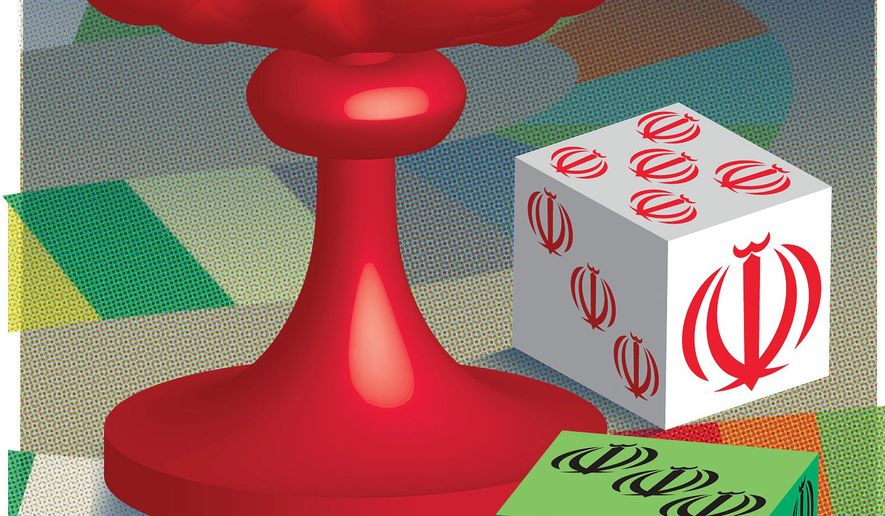OPINION:
President Lyndon Johnson and his Defense secretary found out during the Vietnam War that using military force to send signals is a very imprecise way of doing diplomacy. It is still unclear exactly what the Iranians were up to on Jan. 7, when they launched a barrage at two U.S. bases in Iraq. It was either an incompetent move on the part of the Iranian leadership and the Revolutionary Guard Corps (IRGC) to avenge a fallen leader or a bizarre signal to the United States that Iran wants to end the cycle of violence that began with the death of a U.S. contractor and reached a climax with the immolation of Gen. Qassem Soleimani in an American air strike.
Either way, the first week of 2020 was a bad one for Iran’s ambitions in the region and world. President Trump’s use of kinetic force put Tehran off its game. That and the botched attack on the U.S. bases both failed to satisfy hard-line Iranians who want revenge for Soleimani’s death and made the IRGC look foolish in the eyes of the world. The shoot-down of the Ukrainian airliner was an additional humiliation.
Those in the West — and I’m one of them — who were surprised at the relative speed of the Iranian response were equally dumbfounded by its ineptitude. Decision-making in Tehran is admittedly opaque, but we do know that it is usually characterized by an attempt to reach consensus between the office of the supreme leader, the IRGC and the civilian bureaucracy.
Mr. Trump has embraced the view that the Iranians are standing down and may want to pursue negotiations. That would be a good thing for both nations and the world in general. Some observers believe that Soleimani had become a threat to the ayatollahs and was too hard-line even for Supreme Leader Khamenei.
In that case, Iranian outrage would merely represent crocodile tears by a regime glad to be rid of him and that the botched air base attack was merely for public consumption at home to save face. That’s one possibility.
The alternative is a “business as usual” approach by Iran. It is possible — if not probable — that the attack on U.S. bases was merely a placeholder for a much more robust retaliation.
In the confusion following the unexpected American action in killing Soleimani, it is possible that Ayatollah Khamenei wanted to do something — anything — immediately to show that Iran was not cowed. When you want something done quickly without proper prior planning, it usually ends badly; the attack on the bases was done badly indeed.
If Iran is planning further action, it will require the aforementioned process of internal consensus-building and rounding up the usual suspects to act as proxies for the future attack. We probably won’t know if that is the case until an attack happens, but such an action would be consistent with past Iranian behavior.
So far, Mr. Trump has shown restraint and is willing to take a wait-and-see attitude. What has changed is that the president has drawn a red line concerning the death of Americans and has shown in no uncertain terms that he is willing to enforce it. Several Iraqi militia leaders have openly threatened to take lethal revenge on Americans within Iraq. If that happens, one or more of them may suddenly go up in flames. That would be a chilling warning to other regional Iranian proxies.
Many Democrats are calling for a softer line toward Iran and a return to policies that created a toothless nuclear deal and an increase in regional mischief that Iran undertook following the nuclear agreement. Mr. Trump has made it clear that he is not seeking American-induced regime change in Iran. He insists that a change in behavior will suffice to ease tensions.
But unlike Barack Obama, the current president wants to see concrete results on both the nuclear and proxy warfare fronts before American sanctions are relaxed.
If the theory that Soleimani was the stumbling block to peace is correct, Iran has an unprecedented opportunity, but powerful interests — particularly the IRGC — have money and prestige wrapped up in both nuclear weapons development and expanding Iranian power regionally. There may be voices of moderation in the country, but the IRGC has the guns; and guns count.
Our energy independence means that we don’t need the Middle East the way we once did, but we need to stay engaged in the region diplomatically and militarily. If 9/11 showed us nothing else, we are no longer an island.
• Gary Anderson Lectures on Alternative Analysis at George Washington University’s Elliott School of International Affairs. He has served as a civilian adviser in Iraq and Afghanistan.




Please read our comment policy before commenting.